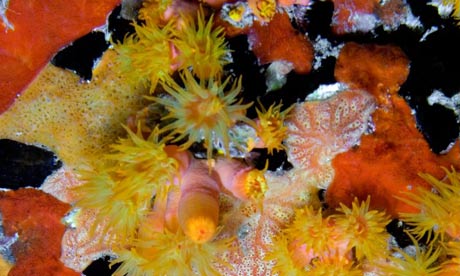 The Guardian, January 24 2008
The Guardian, January 24 2008
Storm damage from waves and death of vital algae likely to become more common, report warns
Warmer seas and a record hurricane season in 2005 have devastated more than half of the coral reefs in the Caribbean, according to scientists. In a report published yesterday, the World Conservation Union (IUCN) warned that this severe damage to reefs would probably become a regular event given current predictions of rising global temperatures due to climate change.
According to the report, 2005 was the hottest year on average since records began and had the most hurricanes ever recorded in a season. Large hotspots in the Atlantic and the Gulf of Mexico powered strong tropical hurricanes such as Katrina, which developed into the most devastating storm ever to hit the US.
In addition to the well-documented human cost, the storms damaged coral by increasing the physical strength of waves and covering the coast in muddy run-off water from the land. The higher sea temperature also caused bleaching, in which the coral lose the symbiotic algae they need to survive. The reefs then lose their colour and become more susceptible to death from starvation or disease.
Impacts
Carl Gustaf Lundin, head of the IUCN’s global marine programme, said: “Sadly for coral reefs, it’s highly likely extreme warming will happen again. When it does, the impacts will be even more severe. If we don’t do something about climate change, the reefs won’t be with us for much longer.” Some of the worst-hit regions of the Caribbean, which contains more than 10% of the world’s coral reefs, included the area from Florida through to the French West Indies and the Cayman Islands. In August 2005 severe bleaching affected between 50% and 95% of coral colonies and killed more than half, mostly in the Lesser Antilles.
The IUCN report highlights pressures on coral reefs in addition to those of overfishing and pollution identified in recent years. A recent study found that reefs near large human populations suffered the most damage.
Coral reefs are an important part of the marine ecosystem, supporting an estimated 25% of all marine life including more than 4,000 species of fish. They provide spawning, nursery, refuge and feeding areas for a wide variety of other creatures such as lobsters, crabs, starfish and sea turtles. Reefs also play a crucial role as natural breakwaters, protecting coastlines from storms.
“It’s quite clear that the structure and their function as they are right now in the Caribbean is quite severely impeded,” said Lundin. “Over the next few decades we will see a large reduction in the number of reef areas.”
Reefs also boost the local economy – in the Caribbean coral reefs provide more than $4bn (£2bn) a year from fisheries, scuba-diving tourism and shoreline protection. According to an analysis by the World Resources Institute: Reefs at Risk, coral loss in the region could cost the local economy up to $420m every year.
Damaging
“The only possible way to sustain some live coral on the reefs around the world,” said the report, “will be to carefully manage the direct pressures like pollution, fishing and damaging coastal developments, and hope that some coral species are able to adapt to the warmer environment.”
Lundin said managing these more direct pressures on reefs would lessen the impact of rising sea temperatures. “Over time we’ll also see transitional species; if we give nature enough time it’s possible some coral will actually cope with the warmer water and we’ll get another composition of the reef,” he said.
Despite this, the report concluded that a dramatic reduction in greenhouse gas emissions in the next 20 years would be “critical to control further warming and dangerously high CO2 levels that will probably reduce the robustness and competitive fitness of corals and limit the habitats for many other organisms living on Caribbean coral reefs”.
The report was compiled from data and observations of coral bleaching from more than 70 coral reef workers and volunteer divers, and was launched to coincide with the first day of the International Year of the Reef 2008, a global campaign coordinating activities by 225 organisations in 50 countries to raise awareness about the value of coral reefs and the threats they face.
Backstory
The 2005 hurricane year broke all records, with 26 named storms, including 13 hurricanes. In July, the unusually strong Hurricane Dennis struck Grenada, Cuba and Florida, while Hurricane Emily set a record as the strongest to hit the Caribbean before August. Hurricane Katrina in August was the most devastating storm to hit the US, causing massive damage around New Orleans. Hurricane Rita passed through the Gulf of Mexico to strike Texas and Louisiana in September. Hurricane Wilma in October was the strongest Atlantic hurricane on record and caused major damage in Mexico. The season ended in December when tropical storm Zeta formed, before petering out in January. Many of these hurricanes caused considerable damage to the reefs via wave action and run-off of muddy, polluted freshwater.
